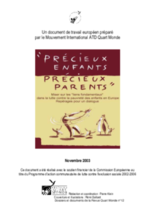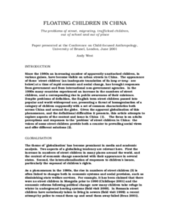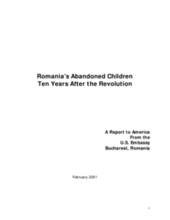Displaying 14281 - 14290 of 14580
This paper outlines the response of Save the Children to the civil war outbreak in Liberia. Using the concept of child participation, the organization was able to address the needs of the children, which included family tracing and reunification, child protection and education.
Discussion of the cost of care and support for children affected by HIV/AIDS in South Africa, with a recommendation for the combined use of state based interventions and community based solutions.
An analysis of the multi-level factors present in the lives of children living and working on the streets. The author advocates for integrating human rights and child participation based approaches into interventions and supports for at-risk children.
Precieux enfants, Precieux parents rappelle le principe de « continuité familiale » que certains identifient comme un principe de base de l’action de protection de l’enfance au debut du 21 siècle. Il pousse à envisager «la protection de l’enfant » comme un travail de « promotion durable du groupe familial, de ses membres et de ses réseaux».
Examines the emergence of children living and working on the streets in China. Disaggregates 'street children' as a phenomenon by outlining the underlying causes for their situations. Compares adult perceptions of 'street children' with the children's own perspectives.
This article, a chapter from the book Family Foster Care in the Next Century, describes several innovative types of shared family care arrangements that demonstrate promise in the protection of children and the promotion of family well-being.
The central theme of this volume is accountability for outcomes, certainly a current driving force in child welfare as well as in other public and private service fields.
This article, a chapter in the book Family Foster Care in the Next Century, describes how child well-being has been conceptualized and measured in research on family foster care, and discusses the essential dimensions that should be included in a useful measure of child well-being.
An account of the massive child welfare crisis in Romania which erupted from a movement in Romania during its communist regime to institutionalize thousands of children. This paper also reports the efforts of NGO’s, PVO’s and the international communities to reverse the damage after the fall of communism and also where the efforts need to be directed.
This study, commissioned by UNICEF, examines formal fostering policy and practice from the point of view of the Rwandan government and fostering agencies, and explores the perceptions of fostering of children, foster parents, local authorities and other members of local communities.






